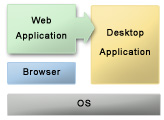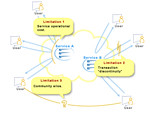2007 Flashbacks
January 8th, 2008 by jeremychone | Comments OffI have not even started blogging 2008 and I am already late for my look back at `07. As a “somewhat” regular blogger, it’s my duty to “jump in the pool” by sharing my thoughts on the year in technology , Model 2007. With my last experience in Adobe, I am now equally interested in the consumer and enterprise technology markets. So, here is my insider’s take on the year just passed.
Facebook: A New King is Born
![]() Facebook was undeniably one of the major internet phenomena of 2007. While its online Internet platform was not a new concept in 2007 (e.g., Oracle Mobile Studio), it is definitely fair to say that Facebook matured the concept and pushed it to the masses. I have been impressed by Facebook’s execution on the technical, business, and developer/end-user experience fronts. Facebook has successfully created a new market for itself, and is ruling it.
Facebook was undeniably one of the major internet phenomena of 2007. While its online Internet platform was not a new concept in 2007 (e.g., Oracle Mobile Studio), it is definitely fair to say that Facebook matured the concept and pushed it to the masses. I have been impressed by Facebook’s execution on the technical, business, and developer/end-user experience fronts. Facebook has successfully created a new market for itself, and is ruling it.
I personally think that Facebook has the potential to endure like Microsoft, Google, Apple, and Oracle. I also think that Microsoft prefers it that way, and it is one of the main reasons why they boosted Facebook’s valuation to $15B (TechCrunch: “Facebook Takes the Microsoft Money And Runs”).
iPhone: Great marketing starts when entertainment supercedes education
 Another big phenomenon of 2007 was the iPhone. I am almost more fascinated by the buzz around it than by the product itself. I do not think that everything was planned, but the combination of Steve Jobs’ excellent keynotes, a great product, the desire of users for slick designs, and some entertaining PR glitches, turned this new device into a blockbuster phenomenon. iPhone even had gross weekend sales reports, as do Hollywood movies. Needless to say, with Steve Jobs, Apple has everything it needs to succeed in this new marketing age.
Another big phenomenon of 2007 was the iPhone. I am almost more fascinated by the buzz around it than by the product itself. I do not think that everything was planned, but the combination of Steve Jobs’ excellent keynotes, a great product, the desire of users for slick designs, and some entertaining PR glitches, turned this new device into a blockbuster phenomenon. iPhone even had gross weekend sales reports, as do Hollywood movies. Needless to say, with Steve Jobs, Apple has everything it needs to succeed in this new marketing age.
From a practical standpoint, Apple reinvigorated the mobile market, and this benefits everybody. So, as a non-iPhone user, I thank Apple for entering this market and pushing the standard up.
Oracle: Self-Predicted Prophecy
| Larry demanded it, Oracle did it. What might have seemed unthinkable a decade ago has now happened. Oracle and SAP have entered a channel expansion spree which consisted of buying most of the major enterprise companies, such as Siebel, PeopleSoft, Business Object, and Hyperion. Larry predicted it in early 2000, and made it happen in less than a decade. |
As Larry used to say, “I prefer to pay $1B and be right, than $100 Million and be wrong”. Well, Oracle did apply his philosophy pretty well.
I actually think this is a very good strategy for companies the size of Oracle or SAP. The consolidation in this market was probably inevitable, given the fact that what big enterprise customers are really looking for when signing an software license/support contract is the insurance on the product as much as the product itself.
This does not change the fact that enterprise innovation can still happen outside of these big companies, it just changes the opportunities (i.e. exit strategies) associated with these innovations.
Beyond AJAX: Return of the Client
 If AJAX and Web 2.0 were big news in 2006, technologies to go beyond Web browsers could be seen as an early theme marking 2007. As mentioned in the “Return of the Client” post, the main Internet technology providers are aggressively putting strategic technologies on the market to try to seize this new opportunity.
If AJAX and Web 2.0 were big news in 2006, technologies to go beyond Web browsers could be seen as an early theme marking 2007. As mentioned in the “Return of the Client” post, the main Internet technology providers are aggressively putting strategic technologies on the market to try to seize this new opportunity.
Although all of these technologies are somewhat based on standards such as XML, Javascript, HTML, and CSS, they are diverging quite a bit. Standardization might happen at some point (e.g., W3C Web Application Formats Working Group), but this does not seem to be a priority for anybody at this point.
The two noticeable new efforts are Adobe AIR/Flex and Microsoft SilverLight. Early applications seem promising. However, CAUTION, while we might get excited about these new possibilities, making a pixel fly does not necessarily give it a purpose.
Media industry: Mutation Started
 Something a little bit more subtle is the awakening of the media industry to “legitimate” Internet business opportunities. I think that before 2007, the media industry saw the Internet mostly as a threat to their business, and like Bill Gates in the early 90’s, did not really see how to make money out of it. However, after witnessing some almost-no-budget shows such as Ask a Ninja and LonelyGirl15 reaching spectacular audiences, the media industry finally recognized the power and opportunities of the web. I think the WGA Strike is definitely a symptom of this awakening.
Something a little bit more subtle is the awakening of the media industry to “legitimate” Internet business opportunities. I think that before 2007, the media industry saw the Internet mostly as a threat to their business, and like Bill Gates in the early 90’s, did not really see how to make money out of it. However, after witnessing some almost-no-budget shows such as Ask a Ninja and LonelyGirl15 reaching spectacular audiences, the media industry finally recognized the power and opportunities of the web. I think the WGA Strike is definitely a symptom of this awakening.
The industry has entered a first phase which is to monetize traditional productions (i.e., TV shows and movies) with this new media distribution channel. This is mostly a big-fish game, where the latest entry was Apple.
I think the next phase will be for the industry to create a new market for these next generation productions. It will be interesting to watch the incumbents play this new game; YouTube or Apple might be able to become the backbone of a new market.
We can now definitely close 2007. Next post will be the 2008 predictions.



 A few days ago a UK magazine posted a
A few days ago a UK magazine posted a  The famous
The famous